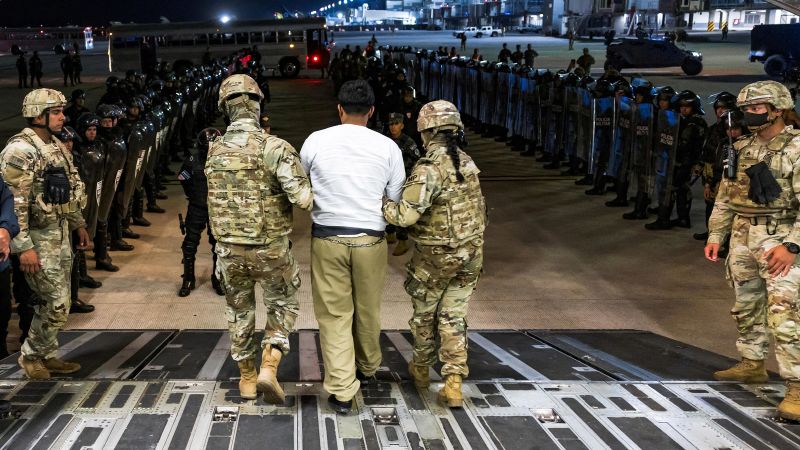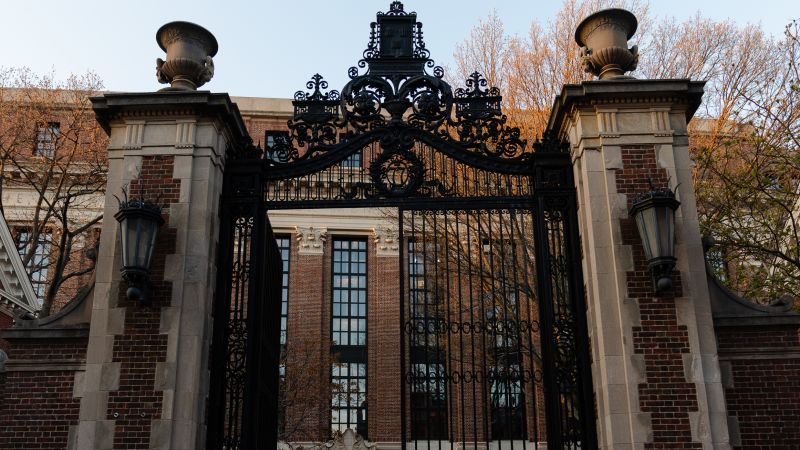Exclusive: Trump's Radical Plan to Offload 500 Venezuelan Criminals to El Salvador's Mega-Prison
Politics
2025-04-28 21:46:44Content

In a bold diplomatic move, the United States is exploring a controversial proposal to transfer up to 500 Venezuelan migrants with suspected connections to the notorious Tren de Aragua criminal gang to El Salvador. This potential arrangement comes as both governments engage in delicate negotiations regarding the use of El Salvador's infamous mega prison.
The proposed plan, revealed through confidential emails obtained by CNN, highlights the complex challenges of managing transnational criminal networks and migration issues. The Tren de Aragua, known for its extensive criminal operations across South America, has been a significant concern for law enforcement agencies in the region.
El Salvador, under President Nayib Bukele's hardline approach to gang violence, has gained international attention for its aggressive strategies in combating organized crime. The potential agreement could represent a unique collaboration between the United States and El Salvador in addressing cross-border criminal activities.
While details of the proposed transfer remain preliminary, the initiative underscores the ongoing efforts to disrupt criminal networks and manage migration challenges in the Western Hemisphere. Both governments are reportedly working to finalize the terms of this unprecedented potential arrangement.
Diplomatic Tensions Escalate: US-El Salvador Migration Negotiation Reveals Complex Geopolitical Challenges
In the intricate landscape of international migration policy, the United States and El Salvador find themselves navigating a complex diplomatic terrain, where geopolitical strategies, security concerns, and humanitarian considerations intersect in unprecedented ways. The proposed transfer of Venezuelan migrants with alleged criminal connections represents a nuanced approach to addressing transnational security challenges.Unraveling the High-Stakes Migration Diplomacy
The Tren de Aragua Gang: A Transnational Criminal Network
The Tren de Aragua, a notorious Venezuelan criminal organization, has emerged as a significant concern for regional security. Originating in Venezuela's prison system, this gang has expanded its criminal operations across multiple Latin American countries, creating intricate networks of illegal activities. Their sophisticated criminal infrastructure spans human trafficking, drug distribution, and violent extortion, posing substantial challenges for law enforcement agencies. The gang's complex operational model involves recruiting vulnerable migrants, exploiting socioeconomic instabilities, and establishing strategic footholds in different national territories. Their adaptability and transnational reach have transformed them from a localized prison gang into a formidable criminal enterprise with far-reaching implications for regional security dynamics.Diplomatic Negotiations and Strategic Containment
The proposed transfer of approximately 500 Venezuelan migrants represents a strategic diplomatic maneuver aimed at containing potential security risks. By collaborating with El Salvador, the United States seeks to implement a targeted approach to managing high-risk migration populations. The negotiations involve intricate discussions about utilizing El Salvador's mega prison system as a potential containment mechanism. This diplomatic strategy reflects a complex interplay of national security interests, humanitarian considerations, and international cooperation. The proposed transfer is not merely a logistical exercise but a nuanced attempt to address the multifaceted challenges posed by transnational criminal networks.El Salvador's Mega Prison: A Controversial Solution
El Salvador's mega prison system has garnered significant international attention for its unconventional approach to managing high-risk criminal populations. Designed to centralize and control dangerous inmates, these facilities represent a bold experiment in penal management. The potential involvement in the proposed migrant transfer highlights the complex role such infrastructure plays in regional security strategies. The prison's design incorporates advanced surveillance technologies, strict segregation protocols, and comprehensive rehabilitation programs. However, the facility has also faced criticism regarding human rights concerns and the potential for creating concentrated environments of criminal networking.Geopolitical Implications and Migration Dynamics
The proposed migrant transfer illuminates broader geopolitical tensions surrounding migration management. It underscores the intricate challenges nations face in balancing security imperatives with humanitarian obligations. The negotiation process reveals the complex diplomatic calculations required to address transnational criminal activities effectively. Venezuelan migration patterns have been significantly influenced by political and economic instabilities, creating unprecedented challenges for receiving countries. The Tren de Aragua gang's exploitation of these migration flows represents a critical concern for regional security architectures.Legal and Ethical Considerations
The proposed transfer raises profound legal and ethical questions about individual rights, due process, and international migration protocols. While national security remains a paramount concern, the approach must carefully navigate complex humanitarian considerations. International legal frameworks provide limited guidance for such unprecedented migration management strategies. The negotiation between the United States and El Salvador represents a potential precedent-setting approach to addressing transnational criminal migration challenges.RELATED NEWS
Politics

Democracy Under Siege: Italy's Calculated Erosion of Democratic Principles
2025-03-18 06:59:41
Politics

Disgraced Congressman's Fall: George Santos Handed Hefty Prison Sentence in Stunning Downfall
2025-04-25 16:17:39
Politics

Wands vs. Ballots: How Harry Potter Characters Are Shaping Political Discourse
2025-03-17 00:10:01





